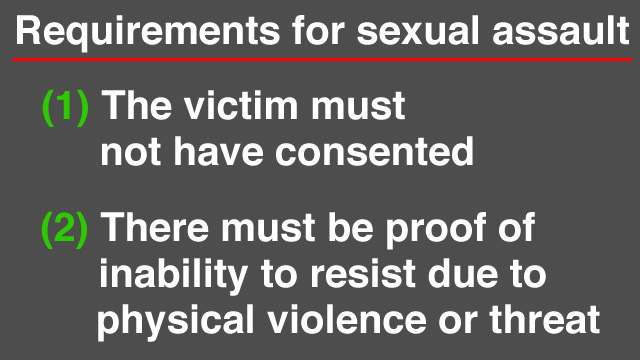The decision that triggered the most debate was made by the Nagoya district court Okazaki branch.
A man on trial for repeatedly raping his 19-year-old daughter was acquitted. Prosecutors alleged that he began raping the child when she was in junior high school. The judge recognized that the man continued to have non-consensual sex with his daughter and threatened to beat her if she refused.
The court ruling stated that it was difficult to conclude that the daughter was in a subordinate position to her father and that he had abused his power. Further, it said that it could not conclude definitively that it was "extremely difficult" psychologically for the daughter to resist her father's approaches -- in other words, she could have resisted if she wanted to.
Under Japanese criminal law, two conditions must be met to conclude that sexual assault has been committed. First, the victim must not have consented, and second, there must be proof that the victim was unable to resist due to physical violence or threats.
Human Rights Now, a Tokyo based international NGO, has found that in countries such as the UK, Germany, Canada and Sweden, inability to resist is not required.

Jun Yamamoto heads a support group for victims of sexual abuse in Japan. She insists that victims are unable to resist assault, even though there are situations where it might seem as though they could.
Yamamoto says she was sexually abused by her father for many years. She did not realize that she was being assaulted because she was too young to understand what was happening. She also found it extremely difficult to resist or reject her father because he had raised her. She says victims experience a feeling of being stabbed in the heart, and then numbness -- a kind of defense mechanism. She said this behavior is misunderstood as consenting to the abuse.
In fact, people have long been questioning the conditions required for concluding sexual assault in Japan.
Minutes from a meeting of an expert panel set up by the Justice Ministry five years ago show one member speaking out on the issue. They said the condition requiring that a perpetrator be found to have taken advantage of a situation where the victim could not resist, is too strict, and that there have been cases where a perpetrator should have been found guilty but was not. The panel member stated that this condition should be removed or relaxed.
But many other members of the panel rejected that proposal, saying it would result in wrongful convictions. One member said it is difficult to prove a victim's claims, while another insisted that the courts have been acting appropriately. There has been no further debate on the issue until now.

Yamamoto's group is calling for a change in the criminal code pertaining to this condition. They delivered a petition earlier this month, asking the Supreme Court and the Justice Ministry to review the law. It states that psychological studies show that sexual abuse victims are often unable to resist, even though resistance may appear possible in some circumstances.
They want people to be more aware of this, and call for training for members of the judiciary to understand the psychological situation of the victims of sexual abuse. They also point to variations in past court rulings on whether a victim has been able to resist, saying the law should be applied equally.
The existing law makes it difficult to prosecute rapists. Yamamoto wants to know why there is no justice in the courts. She believes this is a problem in Japan.
The penal code pertaining to sexual abuse was revised in 2017 for the first time in more than 100 years. It was toughened to include a provision that says a perpetrator can be indicted without a complaint from a victim.
But some lawmakers are still questioning the law in light of the latest not guilty verdicts.
Politicians must understand the reality of sexual abuse, and the damage it inflicts on its victims and society.



